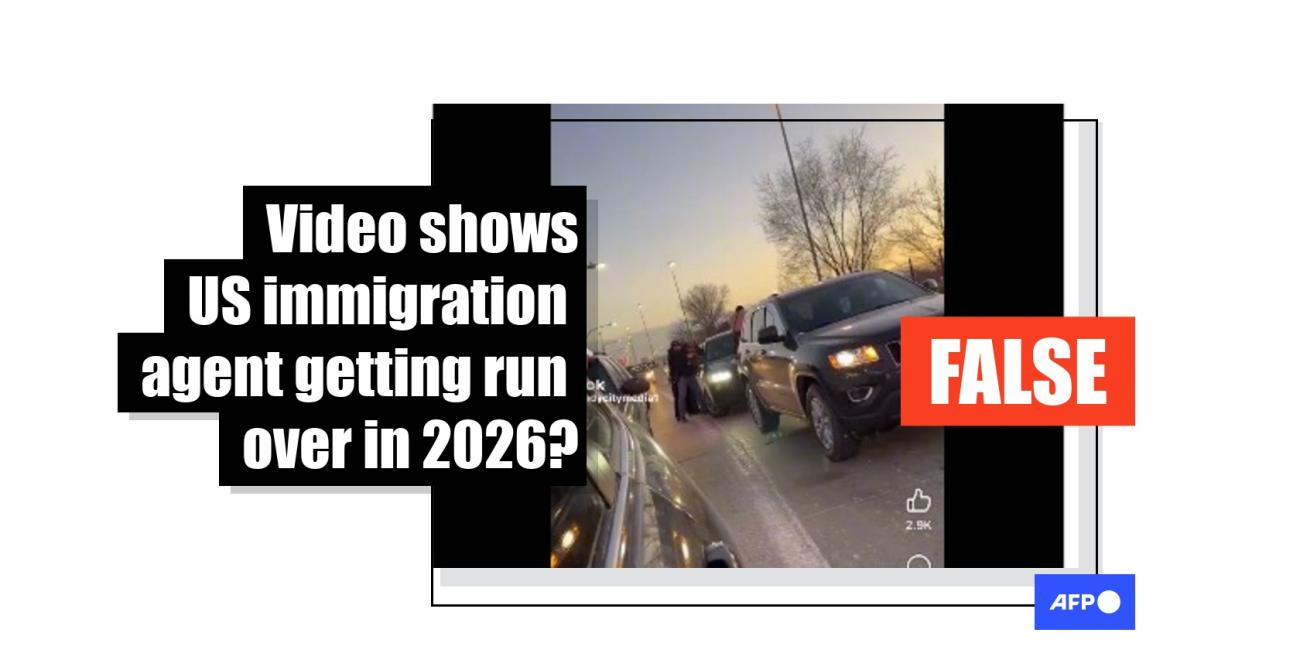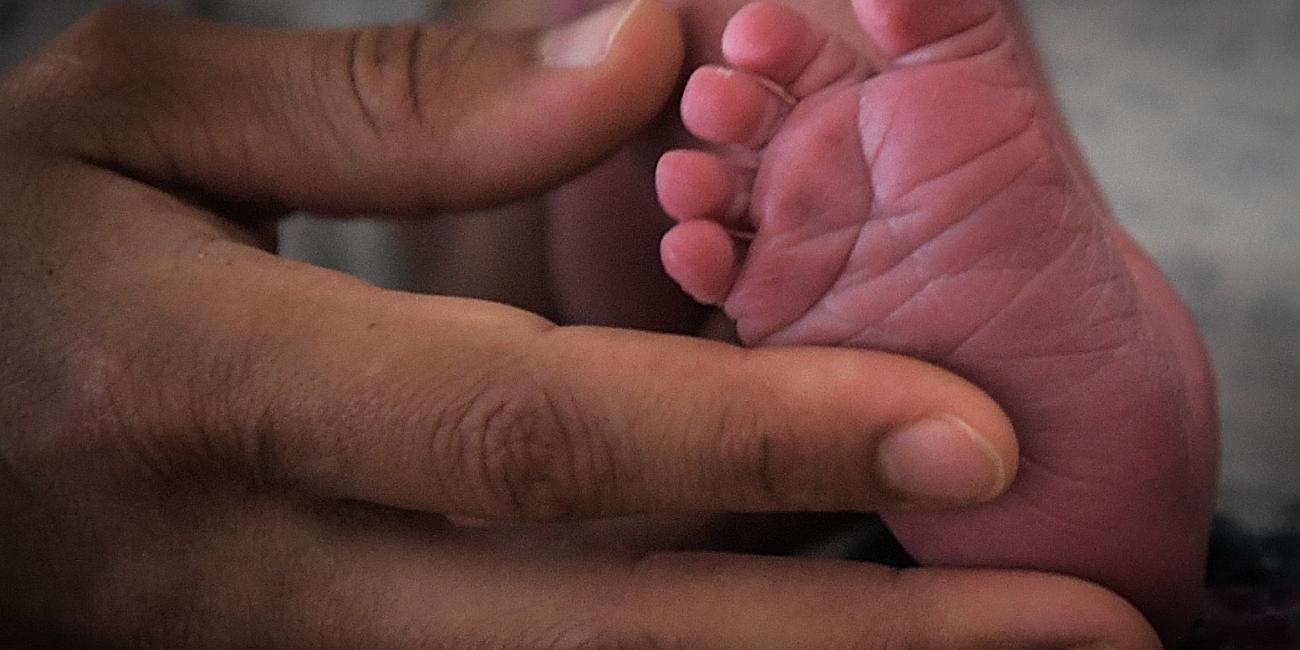
False fraud claims target US swing states ahead of election
- This article is more than one year old.
- Published on October 28, 2024 at 22:36
- 7 min read
- By Marisha GOLDHAMER, AFP USA
US officials say it may take days to determine the results of the 2024 presidential contest due to procedures ensuring absentee and mail-in ballots are accurately recorded. Online claims blaming such a delay on vote rigging are false; fraud is exceptionally rare, and there are several cases in which media projections were not definitive on Election Day.
Across social media platforms, warnings of possible delays in the swing states of Pennsylvania, Michigan, Georgia and Arizona have triggered unfounded claims of cheating.
"Since 1845, our elections have been decided with 24 hrs of election day," claims text over an October 21, 2024 Instagram video.
The post includes footage of an interview featuring Pennsylvania's top election official, Al Schmidt, with the US news program 60 Minutes (archived here).
"The message is please be patient," the Republican secretary of the commonwealth says in the clip. "Our counties are working night and day to count their voters' votes. They're doing so as quickly as they can, and with integrity."
The Instagram post also includes clips of Michigan Secretary of State Jocelyn Benson and Georgia Secretary of State Brad Raffensperger on an October 20 episode of the CBS program "Face the Nation with Margaret Brennan," during which they suggested a winner may not be known on Election Day (archived here and here).
Additional posts on Instagram and X have shared the videos to claim delays in key swing states will be due to malfeasance.
"It's blatantly obvious to anyone with a functioning brain that they’re planning to steal the Election, just like they did in 2020," says an October 22 X post.
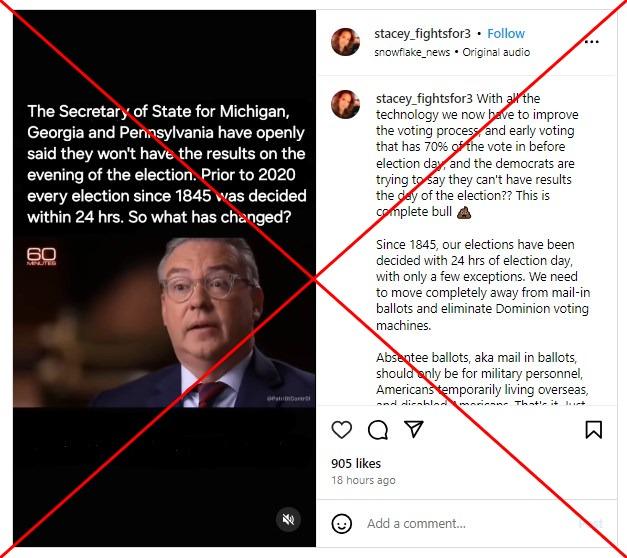
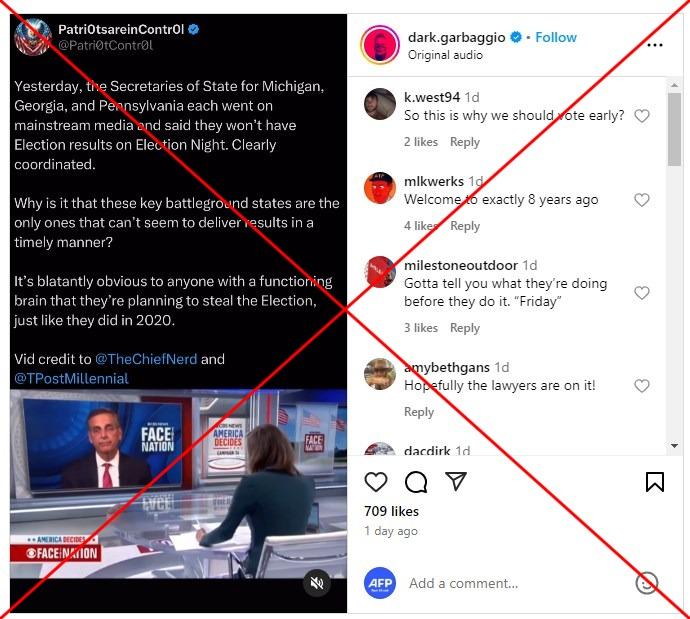
In 2020, it took several days for states to process the high volume of ballots submitted by mail due to the coronavirus pandemic, leaving space for conspiracy theories to flourish.
No courts, audits or recounts surfaced evidence of widespread fraud -- and of the tens of millions of votes cast, the conservative Heritage Foundation documented only a handful of criminal fraud convictions (archived here). Studies compiled by the Brennan Center for Justice, which reviewed fraud cases before 2020, also found wrongdoing is uncommon (archived here).
Still, misinformation is already bubbling up ahead of the November 5, 2024 presidential contest between Vice President Kamala Harris and former president Donald Trump -- including the claims circulating online.
"People are primed to expect that races will be called on election night. That has literally never been an official answer at any point in American history," Justin Levitt, a constitutional law professor at Loyola Marymount University (archived here), told AFP on October 17, 2024.
The Election Assistance Commission says election night results are unofficial, with a potentially lengthy waiting period before certification (archived here).
Calling races
Multiple news organizations have journalists dedicated to calling race winners in elections, with the largest in the United States being the Associated Press (AP).
"Only when AP is fully confident a race has been won -- defined most simply as the moment the trailing candidates no longer have a path to victory -- will we make a call," the news agency says on its website.
"Many races are won on election night, but it's not uncommon for it to take a few days -- and in rare instances, a few weeks -- to reach that point."
Other media outlets, including Fox News, have published similar warnings about the 2024 presidential race.
Levitt said such organizations make predictions based on several factors, including how jurisdictions have voted in past cycles.
"If those predictions take a while longer, it's not a sign that the election's broken -- it's a sign that the election's working," he said.
It's not unusual to have a lack of clarity on election night:
- The election of 1876 led to the unprecedented establishment of a 15-member commission of senators, congressmen and Supreme Court justices to decide the outcome. Rutherford B. Hayes was declared president March 2, 1877 -- nearly four months after the election.
- In 1948, Harry S. Truman posed with a newspaper printed for the morning after Election Day that declared his failed challenger Thomas Dewey was the winner.
- In 2000, US television networks called then-vice president Al Gore as the winner before retracting the decision. The US Supreme Court eventually decided the contest, voting December 12 to stop a recount in the state of Florida, effectively delivering the election to George W. Bush.
Ballot processing
Recounts are one common reason for delays in election results.
In 24 states and the District of Columbia, recounts are automatically triggered when races are within a certain margin -- most commonly 0.5 percent (archived here). Forty-one states and the nation's capital also allow candidates or voters to petition for a recount.
State officials must complete recounts by the December 11, 2024 deadline to certify their slates of presidential electors, as set out by the US Electoral Count Reform Act (archived here).
Each state has its own timetable for counting, canvassing and reporting the final results.
AFP reviewed the laws governing ballot processing and certification in the four states mentioned online.
Pennsylvania
In 2020, it took four days for US media to call Pennsylvania for Joe Biden -- in part because state law prohibits mail-in and absentee ballots from being opened before 7 am on Election Day (archived here).
Schmidt, the secretary of the commonwealth, addressed this process during a public Q&A session in September (archived here): "It takes time to count millions of votes, and Pennsylvania is (at) a unique disadvantage because that process can't begin, like other states, earlier."
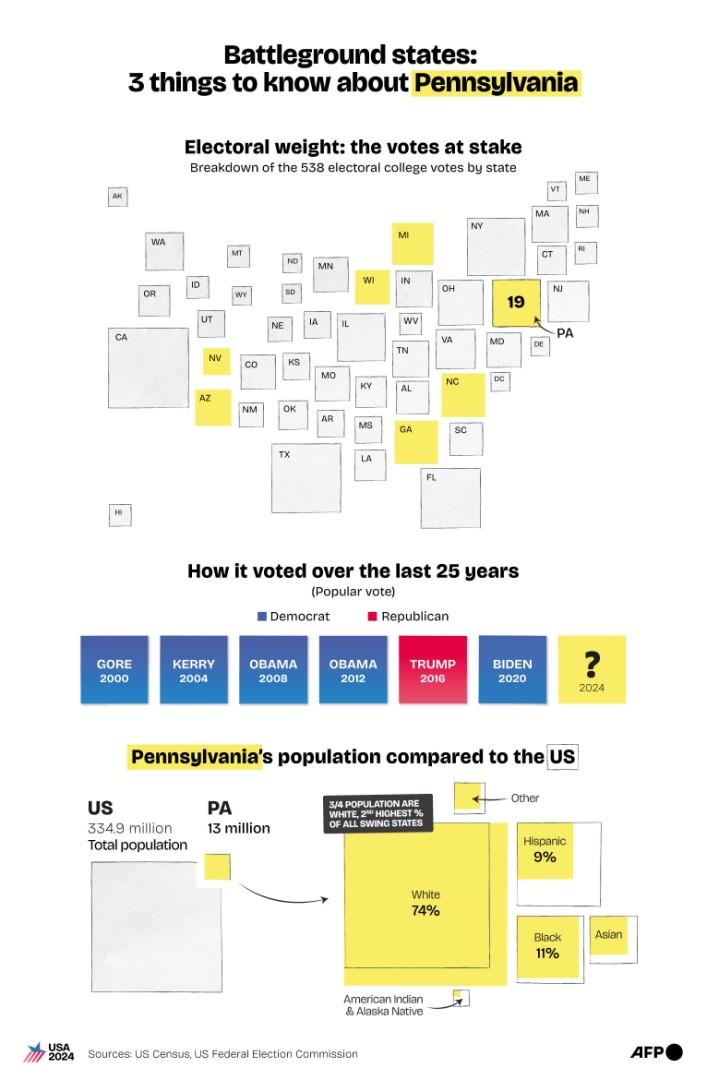
Amy Gulli, director of the Office of Communications for the Pennsylvania Department of State, told AFP in an October 24 email that the agency "typically begins receiving unofficial election results from counties around 9 pm on election night."
Officials in Philadelphia, the largest city in the state, told local reporters they plan to use faster ballot-processing equipment than in past elections to help speed the count.
But Gulli said any unofficial results will not include all votes -- particularly mail-in ballots from military or overseas voters, which have until 5 pm on the seventh day after the election to arrive and be counted.
County boards must deliver unofficial results by 5 pm on November 12 and must certify results by November 25 (archived here).
Michigan
In the clip circulating online, Benson, Michigan's Democratic secretary of state, says she expects to have unofficial results the day after the election.
"In 2020, we had the results of our highest turnout election in Michigan history, within 24 hours of the polls closing," she says. "The unofficial results were completed by 8 pm on Wednesday. So, we're tracking that again this year."
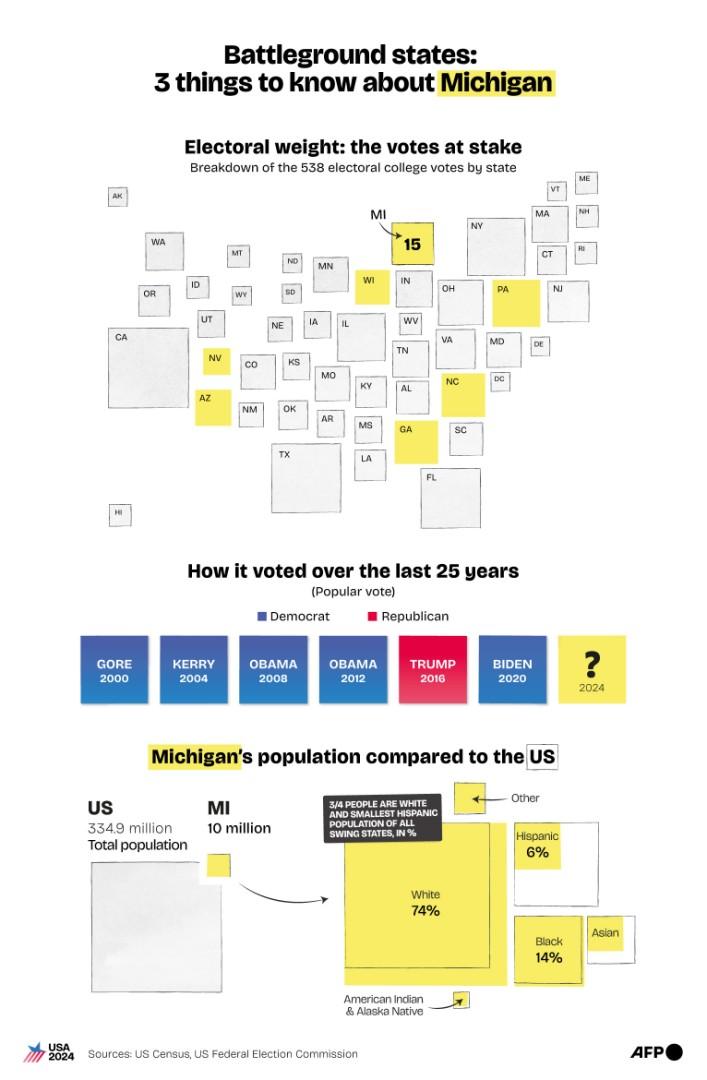
A new state law permits jurisdictions with at least 5,000 people to begin verifying and preparing absentee and mail ballots for tabulation eight days before Election Day. Smaller jurisdictions can start the Monday before the election (archived here).
As in Pennsylvania, the actual counting cannot start until 7 am on Election Day. The Michigan Board of State Canvassers must certify federal races by November 25, 2024 (archived here).
Georgia
Georgia state law allows officials to verify the driver's license or state identification number of the person submitting a ballot upon its receipt. Further processing of absentee and mail ballots can begin at 8 am on the third Monday before Election Day (archived here).
As in Pennsylvania and Michigan, counting will start at 7 am on Election Day.
In the interview shared online, Raffensperger, a Republican, says the law mandates certain results be available November 5.
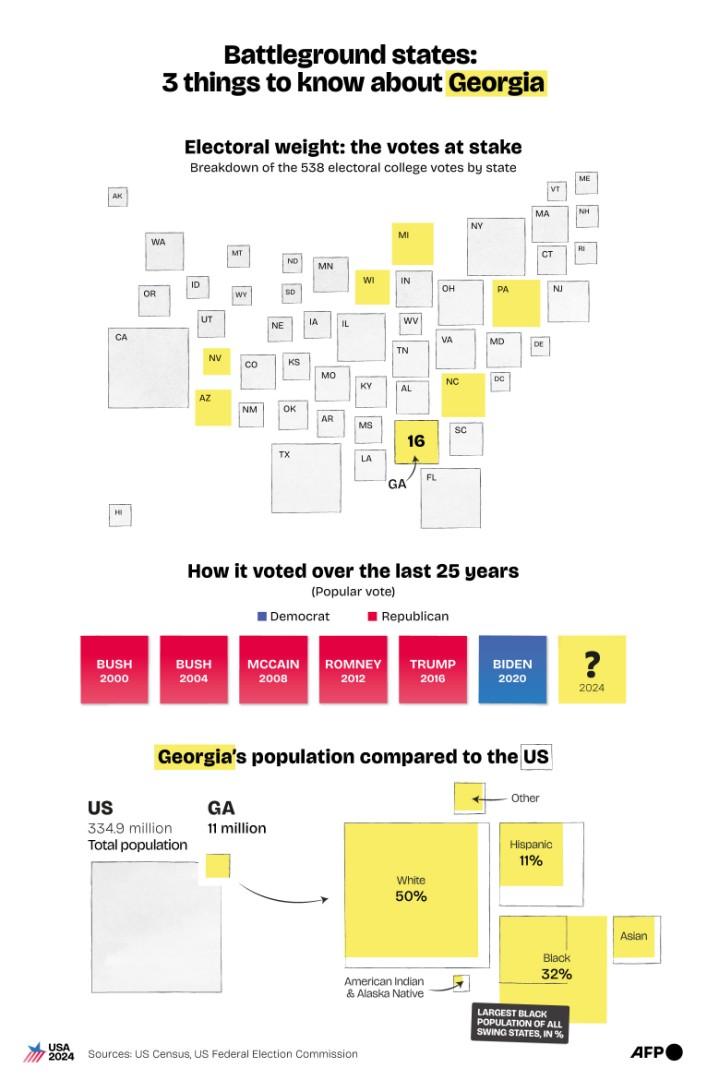
"We also just put into law this year with SB 189 that all early votes and all early accepted ballots, they all will have to have their results reported by 8 pm," he says.
"That's 70, maybe even 75 percent of all the vote totals will be reported no later than 8 pm on election night."
He says what could delay a call in a close race is "the overseas ballots that come in no later than Friday."
Georgia law requires the governor to certify the slate of presidential electors no later than 5 pm on November 23 (archived here).
Arizona
State law permits officials in Arizona to begin processing and tallying ballots as soon as they are received (archived here). More than 75 percent of people vote by mail.
The state has been actively countering misinformation about elections by inviting voters to visit and observe ballot processing. Maricopa County, the largest in the state, produced a six-minute video to show every step of the process.
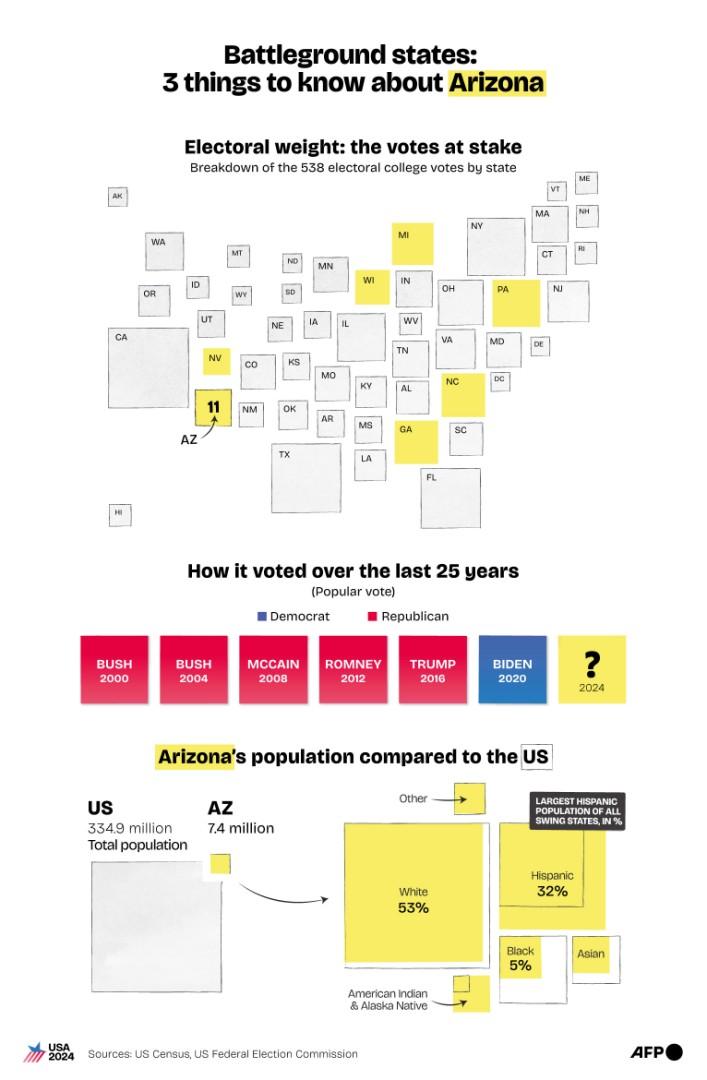
Arizona requires the secretary of state to complete the statewide canvass for the presidential election by November 25 (archived here).
More of AFP's reporting about misinformation targeting the 2024 presidential election is available here.
Copyright © AFP 2017-2026. Any commercial use of this content requires a subscription. Click here to find out more.
Is there content that you would like AFP to fact-check? Get in touch.
Contact us
